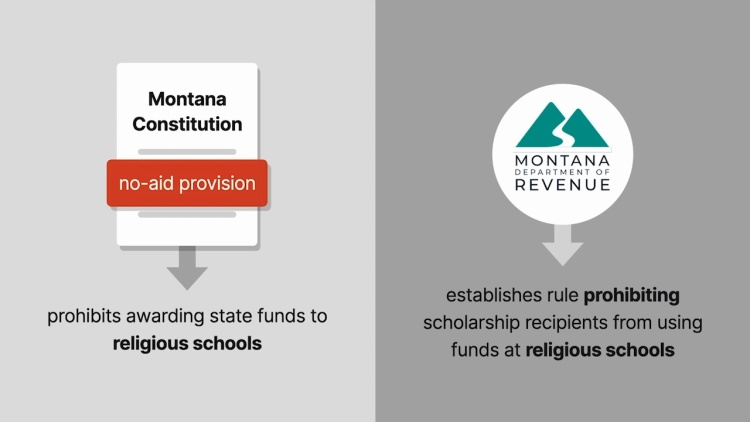Espinoza v. Montana Department of Revenue
United States Supreme Court
140 S. Ct. 2246 (2020)
- Written by Ann Wooster, JD
Facts
The state legislature in Montana enacted a scholarship program for students who attended private schools. Taxpayers received a tax credit for donating to student-scholarship organizations that awarded children scholarships for private-school tuition. The legislature directed that administration of the program should not violate the prohibition against government aid to sectarian schools found in the Montana constitution. The Montana Department of Revenue (defendant) created a rule to prohibit the use of these scholarships at religious schools. Mothers (plaintiffs) representing their children who were not allowed to use these scholarships at a religious school brought suit against the revenue department, challenging the rule. The state trial court enjoined enforcement of the rule because the no-aid provision of the state constitution applied only to appropriations for religious schools, not to tax credits for religious schools. Scholarships were awarded to children who attended a religious school. The Montana Supreme Court then reversed the trial court and struck down the program based on the state constitutional prohibition of government aid to sectarian schools. The United States Supreme Court granted certiorari to address the effect of the Free Exercise Clause of the First Amendment to the United States Constitution on the state scholarship program.
Rule of Law
Issue
Holding and Reasoning (Roberts, C.J.)
Dissent (Breyer, J.)
Dissent (Sotomayor, J.)
What to do next…
Here's why 904,000 law students have relied on our case briefs:
- Written by law professors and practitioners, not other law students. 47,100 briefs, keyed to 995 casebooks. Top-notch customer support.
- The right amount of information, includes the facts, issues, rule of law, holding and reasoning, and any concurrences and dissents.
- Access in your classes, works on your mobile and tablet. Massive library of related video lessons and high quality multiple-choice questions.
- Easy to use, uniform format for every case brief. Written in plain English, not in legalese. Our briefs summarize and simplify; they don’t just repeat the court’s language.





